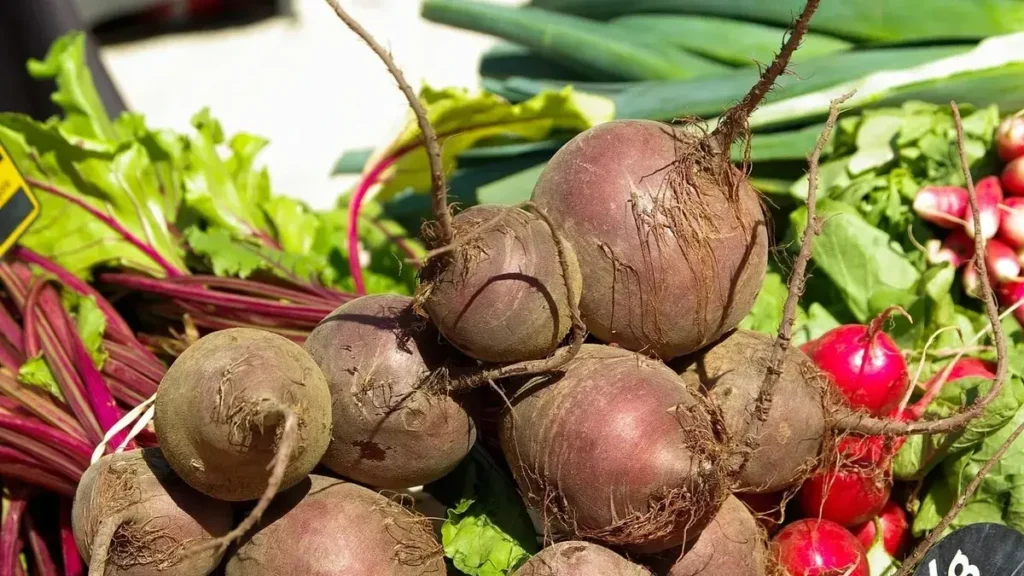Beetroot the deep red, earthy-flavored root vegetable isn’t just a salad ingredient. For centuries, it has been valued for its medicinal properties, and modern research now confirms that this vibrant vegetable plays a powerful role in maintaining healthy blood pressure and supporting cardiovascular health.
THE SCIENCE BEHIND BEETROOT’S CARDIOVASCULAR BENEFITS: HOW THE NITRIC OXIDE PATHWAY SUPPORTS HEART HEALTH
Beetroot is naturally rich in nitrates, compounds that the body converts into nitric oxide (NO). This nitric oxide pathway is the key reason behind beetroot’s heart-protective effects, as it relaxes and widens blood vessels, improves circulation, and lowers pressure on artery walls.
Let’s explore how it works:
• Nitrates from beetroot enter the bloodstream
• Oral bacteria convert nitrates into nitrites
• The body then transforms nitrites into nitric oxide
• Nitric oxide causes vasodilation (the widening of blood vessels).
This results in improved blood flow and lower blood pressure. Many studies show that drinking beetroot juice can lower systolic blood pressure by 4–10 mmHg within a few hours an effect comparable to some first-line medications for mild hypertension.
CARDIOVASCULAR BENEFITS OF BEETROOT
Let’s break down the proven cardiovascular benefits of beetroot as follows:
1. BLOOD PRESSURE REDUCTION: NATURAL CONTROL BACKED BY RESEARCH
Multiple clinical trials confirm beetroot’s ability to reduce both systolic and diastolic blood pressure. A 2024 study in Nutrition, Metabolism and Cardiovascular Diseases found that daily ingestion of 200–800 mg of nitrates from beetroot juice significantly reduced blood pressure in hypertensive patients, with effects lasting up to 90 days.
2. IMPROVED CIRCULATION AND ARTERIAL HEALTH
Regular beetroot consumption reduces arterial stiffness, enhances endothelial function, and lowers oxidative stress due to its high antioxidant content (betalains).
3. ENHANCED EXERCISE PERFORMANCE AND STAMINA
Beetroot juice boosts endurance by:
• Reducing oxygen consumption during activity
• Increasing time to exhaustion
• Boosting cardiovascular efficiency
• Improving blood flow to muscles
4. LONG-TERM CARDIOVASCULAR PROTECTION
Beyond blood pressure control, beetroot supports healthy cholesterol levels, decreases inflammation, and protects against heart disease progression.
NUTRITIONAL PROFILE: WHY BEETROOT IS MORE THAN JUST NITRATES
Beetroot is a nutrient-dense, low-calorie vegetable packed with compounds that strengthen cardiovascular health:
• Folate: Essential for blood vessel health and red blood cell formation
• Potassium: Helps regulate blood pressure
• Manganese: Supports enzyme and antioxidant function
• Vitamin C: Boosts immunity and acts as an antioxidant
• Betalains: Potent antioxidants responsible for beetroot’s red color
• Betaine: May reduce homocysteine, a heart disease risk factor
• Fiber: Promotes digestion and may lower cholesterol
A half-cup of cooked beetroot has only about 40 calories, making it an excellent addition to a heart-healthy diet.
EXTRA HEALTH BENEFITS BEYOND THE HEART
Now, let’s explore the health benefits of beetroot beyond heart health.
• Brain Function: Improved circulation may support cognitive health
• Liver Detoxification: Betalains assist natural detox processes
• Digestive Support: Rich fiber promotes gut health
• Exercise Endurance: Supports sustained physical activity
HOW TO INCLUDE BEETROOT IN YOUR DAILY DIET
For maximum benefits, aim for 200–800 mg of dietary nitrates daily from beetroot sources.
Best options are as follows:
• Fresh Beetroot Juice: 250–500 ml daily, preferably in the morning or 2–3 hours before exercise
• Beetroot Powder: 6–12 g (about 2 teaspoons) added to smoothies or yogurt
• Roasted or Boiled Beetroot: A colorful addition to salads
• Beetroot Smoothies: Blend with carrot, apple, or berries
• Beetroot Hummus or Pickles: For a tangy twist
RECOMMENDATION
If you’re new to beetroot juice, start with half a glass to avoid stomach upset.
SAFETY AND PRECAUTIONS: WHAT YOU SHOULD KNOW
Beetroot is generally safe, but some considerations include:
• Beeturia: Pink/red urine and stools are harmless side effects
• Kidney Stones: Due to beetroot ‘s high oxalate content, means moderation is best for those prone to stones
• Diabetes: Monitor blood sugar as beetroot contains natural sugars
• Blood Pressure Medications: Consult your doctor, as beetroot may amplify their effects
• Digestive Sensitivity: Large amounts may cause mild stomach upset
THE FUTURE OF BEETROOT RESEARCH
Recent 2025 studies highlight beetroot’s potential in:
• Supporting long-term cardiovascular protection
• Enhancing brain health and cognitive function
• Improving athletic performance across different populations
• Understanding the role of oral microbiota in nitrate metabolism
CONCLUSION: WHY BEETROOT DESERVES A PLACE IN YOUR HEART-HEALTHY DIET
The scientific evidence is clear: beetroot deserves its reputation as nature’s blood pressure regulator. With its unique blend of nitrates, antioxidants, and essential nutrients, it offers a natural way to support heart health, improve circulation, and enhance performance.
So, whether enjoyed as juice, powder, salad, or smoothie, beetroot is a simple yet powerful addition to a heart-healthy lifestyle. Combined with regular exercise, a balanced diet, and medical guidance, this vibrant vegetable can help keep your cardiovascular system strong.
Adding beetroot to your meals is a simple step toward a healthier heart.
FAQs About Beetroot and Heart Health
1. How much beetroot juice lowers blood pressure?
Studies suggest 250–500 ml of beetroot juice can lower blood pressure within a few hours, but effects vary by individual.
2. Can beetroot replace blood pressure medication?
No. Beetroot may complement treatment but should not replace prescribed medications without medical advice.
3. Is cooked beetroot as effective as juice?
Juice delivers more concentrated nitrates, but cooked beetroot still provides heart-friendly nutrients.
4. Can beetroot cause side effects?
Mild stomach upset or pink urine (beeturia) is harmless. People with kidney stones should limit intake
DISCLAIMER:
This article is for informational purposes only and should not be considered medical advice. Please consult a qualified healthcare professional before making any decisions about your health or treatment.
Call to Action
Start small add a glass of beetroot juice or a handful of roasted beet slices to your meals today. Your heart will thank you with every beat.
Read more: https://pharmahealths.com/radish-mooli-health-benefits/
References
• Kapil V et al. Hypertension. 2022;79(8):1655-1664.
• Hobbs DA et al. Nutrition, Metabolism & Cardiovascular Diseases. 2024;34(3):499-508.
• Lara J et al. Journal of Nutrition. 2023;153(2):256-264.
• World Health Organization. Diet, Nutrition and Cardiovascular Health. 2023.

